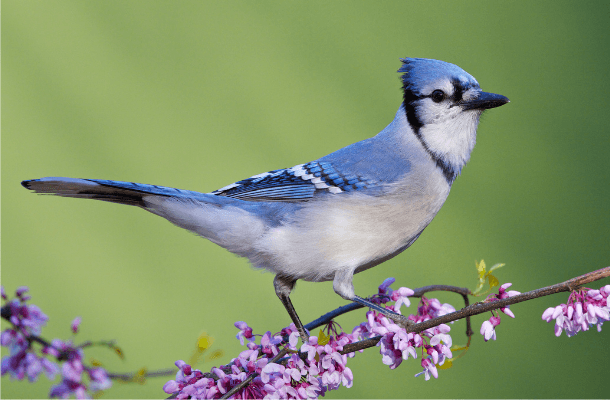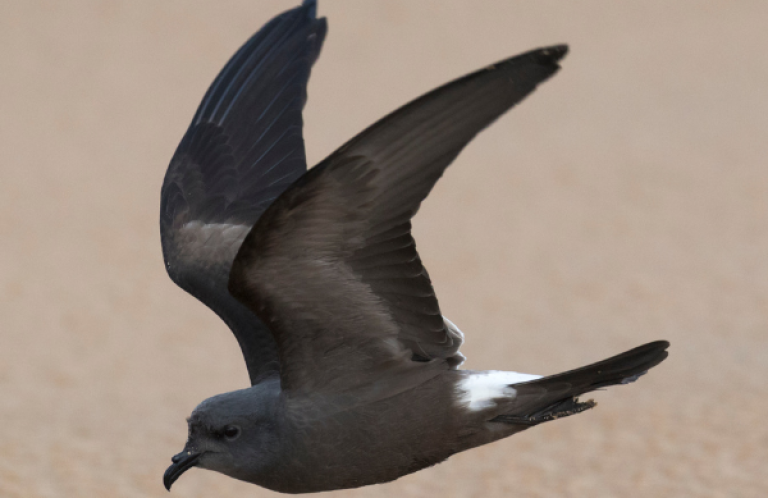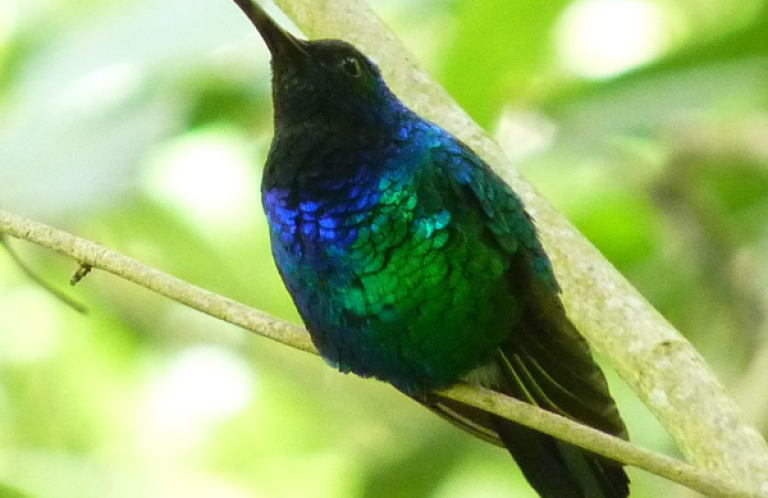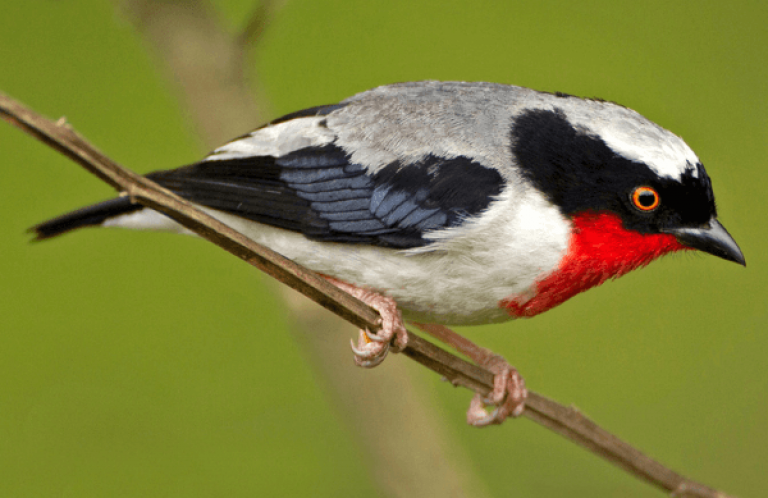As Mid-Atlantic Bird Illness Investigated, Restraint Still Urged for Backyard Bird-Feeding
UPDATE (August 18, 2021): Some states, including Pennsylvania, Maryland, and Virginia, are reporting a decrease in cases of the bird disease discussed in this article, and officials there now say it's okay to resume feeding birds. However, people are urged to be vigilant, and to continue regular cleaning of feeders and baths. Other states, such as North Carolina, have just started to observe incidences of the disease. Check with your state or local jurisdiction for the latest news and recommendation for your specific area.

In the Mid-Atlantic, use of bird feeders should be discontinued for now, but individuals can still support birds, like the Blue Jay, by gardening with native plants and incorporating other natural elements. Photo by Reimar/Shutterstock
(Washington, D.C., July 14, 2021) Earlier this spring, people across the Mid-Atlantic region started reporting an unusually large number of ill and dead birds. The birds, primarily recently fledged American Robins, Blue Jays, Common Grackles, and European Starlings, appeared to have eye and neurological issues. Concerned backyard birdwatchers and veterinarians alike were puzzled by the seemingly random outbreak.
As of mid-July, scientists are still researching the mystery illness's cause and searching for answers. There have not been any human or domestic animal health issues reported in connection to this situation. The U.S. Geological Survey (USGS) has been leading an interagency initiative to document, monitor, and report on this issue. After testing, it's now known that this illness is not related to salmonella poisoning, avian influenza virus, West Nile virus, poxviruses, nor a number of other known pathogens.
To build on the recommendations by USGS and other agencies, American Bird Conservancy (ABC) has additional information to consider and tips to help make your yard a place where you can still support birds locally.
USGS tips are in bold print:
- Stop feeding birds until this wildlife morbidity/mortality event is over.
Removing bird feeders is recommended to reduce any disease spread among groups of birds. Given that it is currently breeding season, many “feeder” birds are now more reliant on invertebrates, anyway: During breeding season, chicks need protein for rapid growth; seemingly tireless parent birds also benefit from a solid dose of insect- and spider-based protein.
You can still help birds coming to your yard. Creating a backyard that supports birds and other wildlife luckily isn't dependent on feeders. Incorporating native plants into your yard is a great option at any time. Many native plants provide naturally grown food, including berries and nectar, and attract invertebrates that birds seek, such as caterpillars. If you maintain native trees, shrubs, and vines on the landscape, you will also encourage birds to nest in your yard or stop for a quick rest during spring or fall migration.
Make sure any plants you use are selected with care. Do not assume that nurseries will only sell you native and/or non-invasive plants.
Don't use chemicals that may harm insects, birds, and other wildlife. Birds eat invertebrates and feed many of them to their young. Just as you wouldn't want children or pets to ingest yard chemicals, the same should hold true for neighborhood wildlife.
- When using them again, maintain clean feeders and also bird baths with regular washes using a 10-percent bleach solution (one part bleach mixed with nine parts water), followed by a water rinse, then complete air-dry.
"Bird feeders are basically the kitchens and dining rooms of our backyards,” says Jordan Rutter, ABC's Director of Public Relations. “It would be hard for us to imagine not washing our dishes. We should think of bird feeders and bird baths in a similar way.”
- Avoid handling birds unless absolutely necessary. If you do handle them, wear disposable gloves. If picking up a dead bird, place an inverted plastic bag over your hand to avoid direct contact.
Please note that state natural resource management and wildlife conservation agencies, along with USGS, National Park Service, Smithsonian Migratory Bird Center (SMBC), and various university laboratories, are investigating this situation. While there is a call for individuals to report observations, there is no need for samples to be collected by private citizens. You can simply report basic information such as date, time, and location online to the SMBC form.
- Keep pets (including pet birds) away from sick or dead wild birds as a standard precaution.
This advice is relevant at any time. Practice and advocate for treating cats like dogs — that is, providing safe and enriching places for pet felines to live indoors full time or supervised and contained outdoors. Learn more about other simple actions you can take to protect birds on our Cats Indoors page. If you are a cat owner, you can also pledge to keep your pet responsibly contained.
Here are some additional ABC tips to help make your yard as supportive of birds as possible:
- Protect birds from glass collisions.
Collisions with glass are a major human-caused threat to birds, killing up to 1 billion annually in the U.S. alone. Because birds see differently than we do, glass poses a serious risk, especially when vegetation or other habitat is reflected in windows. From tape to screens and films, there are many effective, easy-to-install, and inexpensive home solutions to help reduce bird-window collisions. Please visit and share: www.birdsmartglass.org.
- Provide snags for clear sight lines.
You can “plant” a large dead branch in your garden or leave some dead branches in living trees to provide lookout points for birds. You may be surprised how quickly hummingbirds, flycatchers, and other birds adopt these “stick” perches, which help them watch for predators, as well as competitors and food sources.
- Support birds from inside, too.
You can support birds whether you have a yard or not. Consider purchasing bird-friendly coffee, “reduce, reuse, recycle” to help birds in your area or as far away as the middle of the ocean, and you can use your voice by asking your elected officials to support bird conservation efforts.
For more about ABC's top tips to help birds, read how our staff takes action at home too.
###
American Bird Conservancy is a nonprofit organization dedicated to conserving wild birds and their habitats throughout the Americas. With an emphasis on achieving results and working in partnership, we take on the greatest problems facing birds today, innovating and building on rapid advancements in science to halt extinctions, protect habitats, eliminate threats, and build capacity for bird conservation. Find us on abcbirds.org, Facebook, Instagram, and Twitter (@ABCbirds).
Media Contact: Jordan Rutter, ABC Director of Public Relations| jerutter@abcbirds.org | @JERutter


















































